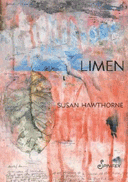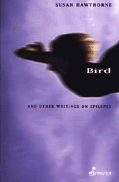Susan Hawthorne – March 25 2018
Purple Day – March 26
Founded in 2008 by nine-year-old Cassidy Megan of Nova Scotia, Canada, to raise awareness of epilepsy.
 Susan is an aerialist, Sanskritist, publisher, and author of poetry, fiction, and non-fiction. She has (co-) edited or authored 10 books, including her published poetry collections Cow and Lupa and Lamb and her verse novella Limen. In 1991, she co-founded Spinifex Press with Renate Klein. Her academic work encompasses literature and creative writing including processes of creative and associative thinking, hypertext, oral literature and translation. Susan is Adjunct Professor at James Cook University, College of Arts, Society and Education and is currently completing a PhD at the University of Melbourne.
Susan is an aerialist, Sanskritist, publisher, and author of poetry, fiction, and non-fiction. She has (co-) edited or authored 10 books, including her published poetry collections Cow and Lupa and Lamb and her verse novella Limen. In 1991, she co-founded Spinifex Press with Renate Klein. Her academic work encompasses literature and creative writing including processes of creative and associative thinking, hypertext, oral literature and translation. Susan is Adjunct Professor at James Cook University, College of Arts, Society and Education and is currently completing a PhD at the University of Melbourne.
 Limen
Limen
Spinifex Press, 2013; ISBN 9781742198606
When two women and a dog set off on a holiday, they have no inkling of what’s to come. They wake to find the river has crept up silently during the night. Trapped by floodwater, they devise escape routes only to be faced with more obstacles at every turn. Only the dog remains calm. This poetic novella grips you with its language, its pace, and its anxieties. The word limen is defined as “a threshold below which a stimulus is not perceived.” In Susan’s Hawthorne’s verse novel, there is the threat of the rising waters – the women’s safety is above the threshold of perception. This definition feeds the suspense and tension of this book. However, the word also suggests a transition, a state, a threshold between earth and sky, between day and night, between water and heat, survival and drowning-and it is these paired states, together with many more that also drive narrative.

Bird and other writings on epilepsy
Spinifex Press, 1999; ISBN 9781875559886
‘Birds don’t fly with leads, I said. / Safety belts are to learn with, not to live with — / I’m safer on the trapeze than crossing the road. / And I do that every day, often by myself.’ So thirteen-year-old Avis argues when confronted by the limitations imposed on her at school. She has epilepsy and some of the teachers want to stop her from participating in the sport she loves most. From societal limitations to the inner experience of seizures, Susan Hawthorne’s poetry takes the reader on a journey rarely recorded. Physical injury, memory loss, explorations of consciousness and language are the concerns of the poet.
